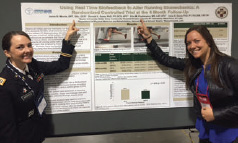AMTI News Archive 2017
December 2017

TATRC manages the AMEDD Advanced Medical Technology Initiative (AAMTI) Program that facilitates bottom-up technology innovation while simultaneously informing top-down acquisition throughout Army Medicine. To submit a proposal to the system for consideration, Army Innovators must utilize the AAMTI Proposal Submission System.

Because of their theoretical ability to resist bacterial colonization and portability, biologic meshes hold immense promise for abdominal wall reconstruction in battlefield casualties and during complex ventral hernia repair in the presence of moderate to severe contamination within the peritoneal cavity. Despite advances in the development of bioprosthetics and improvements in surgical techniques, mesh infection remains a challenging and costly complication.

There is tremendous interest to develop new technologies that can have transformative impact on human brain functioning. The objectives span the gamut from supporting recovery for the severely injured, to optimizing the skills of elite performers. Researchers from the DoD, universities, and industry, are pioneering and collaborating to achieve breakthroughs for our most complex organ.
September 2017

A non-rearfoot strike pattern, or decreased average vertical loading rate during running has been suggested to reduce injuries. Historically, transitioning a runner from a rearfoot to a non-rearfoot strike involved 8 – 18 visits of one-on-one feedback over 2 – 6 weeks. Wearable technology consisting of Bluetooth enabled instrumented socks were recently developed to provide runners with biofeedback.

Regionally Aligned Forces (RAF) stationed in Eastern Europe in support of Atlantic Resolve, have virtual access to health care from their Garrison provider or specialists at Landstuhl Regional Medical Center (LRMC), thanks to the Regional Health Command Europe (RHCE) “TeleHealth In A Bag” (THIAB) platform.

Many medical combat training scenarios incorporate theatrical makeup, known as moulage, to simulate real life wounds. The Val G. Hemming Simulation Center (VGHSC) of the Uniformed Services University of the Health Sciences (USUHS) has developed a variety of temporary wound tattoos specifically for medical combat simulations.

Point of injury care remains a focal point in military medicine. During special operations and conventional conflicts, military medical providers are frequently required to perform life-saving interventions under hostile conditions in low-light environments.

The AMEDD Advanced Medical Technology Initiative (AAMTI) is continuously seeking innovation. What is the definition of innovation? According to the Merriam Webster, it is “a new idea, method, or device.”
June 2017

The Army Surgeon General, through TATRC, provides a special Defense Health Program, Operations and Maintenance appropriation to enable technology proofs of concept and demonstrations throughout the MEDCOM.

The AAMTI Team, led by Ms. Holly Pavliscsak had a very successful submission season this year! There were 83 AAMTI pre-proposals submitted for the FY18 AAMTI Cycle, including 35 new submitters! There were 14 reviewers from a wide variety of backgrounds that reviewed the pre-proposals through 8 June. Invitations for full proposal submissions were sent out the week of 26 June. Thank you to all those who took the time to submit your great ideas! The AAMTI Team appreciates your contributions.

Antibiotic resistance is a significant hindrance to the preservation of life and limb in the military healthcare setting and is a significant threat to U.S. military personnel. Indeed, during the height of the conflicts in Iraq and Afghanistan, there was an increase in wound infections caused by multi-drug resistant organisms. Multi-drug resistant organisms are linked to an increase in the morbidity and mortality associated with wound infection and a concomitant increase in the economic burden of wound care treatment.

Over the past decade there has been a resurgence of tourniquet use in civilian and military settings. Several key challenges include assessment of limb perfusion and adequacy of tourniquet placement, particularly in the austere or pre-hospital environments.
March 2017

Just a reminder AAMTI Pre-proposals are due by April 12th this year. The TATRC website, http://www.tatrc.org/legacy/www1/ labs-and-programs/aamti/, contains updated Program Instructions for FY18 and step-by-step instructions for obtaining an account and submitting a preproposal. Please check it out and get those pre-proposals rolling in!

An anterior foot strike pattern during running has been suggested to reduce injuries. A mobile feedback system may assist in transitioning to this style of running.

The Army Surgeon General, through TATRC, provides a special Defense Health Program, Operations and Maintenance (DHP O&M) appropriation to enable technology proofs of concept/demonstrations throughout the MEDCOM.

The AMEDD Advanced Medical Technology Initiative (AAMTI) Program’s Rapid Innovation Fund (RIF) proposals for small scale demonstrations of commercial off the shelf (COTS) or government off the shelf (GOTS) technologies are now able to be submitted through the AAMTI Submission System!